Planning Sessions Based On Collaboration
Develop a project management plan using a suitable methodology for an approved specific topic, producing a plan to a professional standard that applies estimation techniques and the development of a full planning and scheduling process in a professional software package.
32 Pages6239 Words482 Views
Added on 2023-04-21
About This Document
This document provides a detailed plan for organizing a 2-day event based on collaboration. It includes objectives, deliverables, project scope, stakeholder analysis, and a Gantt chart for the conference session.
Planning Sessions Based On Collaboration
Develop a project management plan using a suitable methodology for an approved specific topic, producing a plan to a professional standard that applies estimation techniques and the development of a full planning and scheduling process in a professional software package.
Added on 2023-04-21
ShareRelated Documents
Running head: PLANNING SESSIONS BASED ON COLLABORATION
Planning Sessions Based On Collaboration
Name of the Student
Name of the University
Author’s note
Planning Sessions Based On Collaboration
Name of the Student
Name of the University
Author’s note
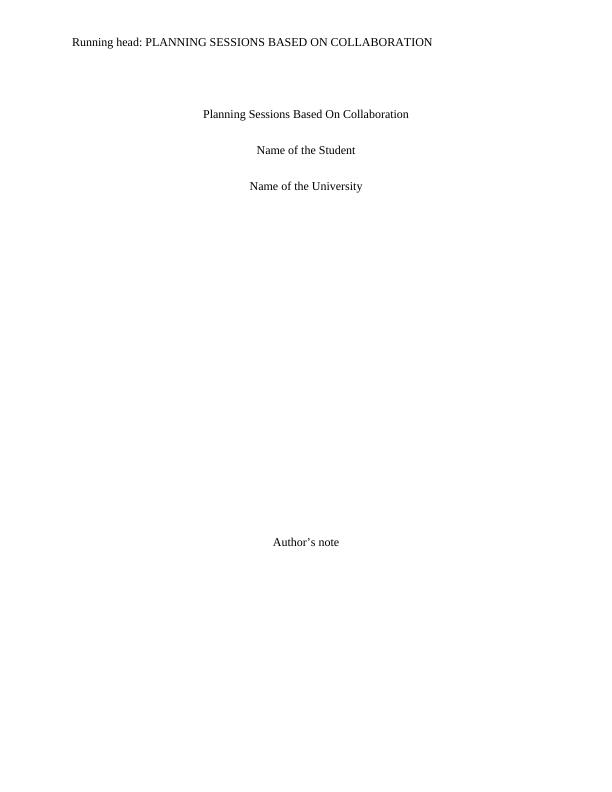
1PLANNING SESSIONS BASED ON COLLABORATION
Table of Contents
Executive Summary.........................................................................................................................3
1. Background and Purpose.............................................................................................................4
2. Project Scope...............................................................................................................................4
2.1 Objectives..............................................................................................................................4
2.2 Deliverables...........................................................................................................................4
2.3 Limitations.............................................................................................................................5
2.4 Exclusions..............................................................................................................................5
2.5 Technical Details...................................................................................................................5
2.6 Stakeholder Analysis.............................................................................................................6
2.7 Gantt Chart and Network Diagram of Conference Session...................................................7
2.8 Gantt Chart and Network Diagram of Dinner Session........................................................11
2.9 Time and Cost and of the Project........................................................................................14
2.10 Quality Standard Details....................................................................................................14
3. Project Assumptions and Risks.................................................................................................14
3.1 Assumptions........................................................................................................................14
3.2 Risks....................................................................................................................................15
4. Project Management Methodology............................................................................................16
4.1 Methodology Selection........................................................................................................16
4.2 Justification..........................................................................................................................16
Table of Contents
Executive Summary.........................................................................................................................3
1. Background and Purpose.............................................................................................................4
2. Project Scope...............................................................................................................................4
2.1 Objectives..............................................................................................................................4
2.2 Deliverables...........................................................................................................................4
2.3 Limitations.............................................................................................................................5
2.4 Exclusions..............................................................................................................................5
2.5 Technical Details...................................................................................................................5
2.6 Stakeholder Analysis.............................................................................................................6
2.7 Gantt Chart and Network Diagram of Conference Session...................................................7
2.8 Gantt Chart and Network Diagram of Dinner Session........................................................11
2.9 Time and Cost and of the Project........................................................................................14
2.10 Quality Standard Details....................................................................................................14
3. Project Assumptions and Risks.................................................................................................14
3.1 Assumptions........................................................................................................................14
3.2 Risks....................................................................................................................................15
4. Project Management Methodology............................................................................................16
4.1 Methodology Selection........................................................................................................16
4.2 Justification..........................................................................................................................16
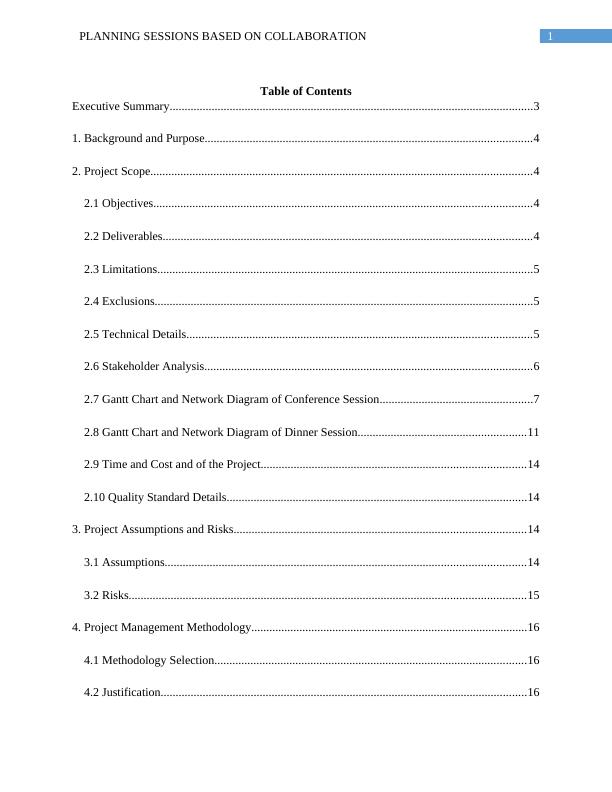
2PLANNING SESSIONS BASED ON COLLABORATION
5. Project Organization..................................................................................................................16
6. Work Breakdown Structure.......................................................................................................18
7. Project Milestones.....................................................................................................................20
8. Resource Management Plan......................................................................................................21
8.1 Human Resource..................................................................................................................21
8.2 Equipment and Others.........................................................................................................22
9. Budget Details...........................................................................................................................22
10. Stakeholders Communication Management Plan....................................................................24
11. Change Management Plan.......................................................................................................25
12. Risk Management Plan............................................................................................................26
13. Quality Control and Audition..................................................................................................27
14. Project Closure.........................................................................................................................27
Bibliography..................................................................................................................................28
Appendix........................................................................................................................................31
5. Project Organization..................................................................................................................16
6. Work Breakdown Structure.......................................................................................................18
7. Project Milestones.....................................................................................................................20
8. Resource Management Plan......................................................................................................21
8.1 Human Resource..................................................................................................................21
8.2 Equipment and Others.........................................................................................................22
9. Budget Details...........................................................................................................................22
10. Stakeholders Communication Management Plan....................................................................24
11. Change Management Plan.......................................................................................................25
12. Risk Management Plan............................................................................................................26
13. Quality Control and Audition..................................................................................................27
14. Project Closure.........................................................................................................................27
Bibliography..................................................................................................................................28
Appendix........................................................................................................................................31
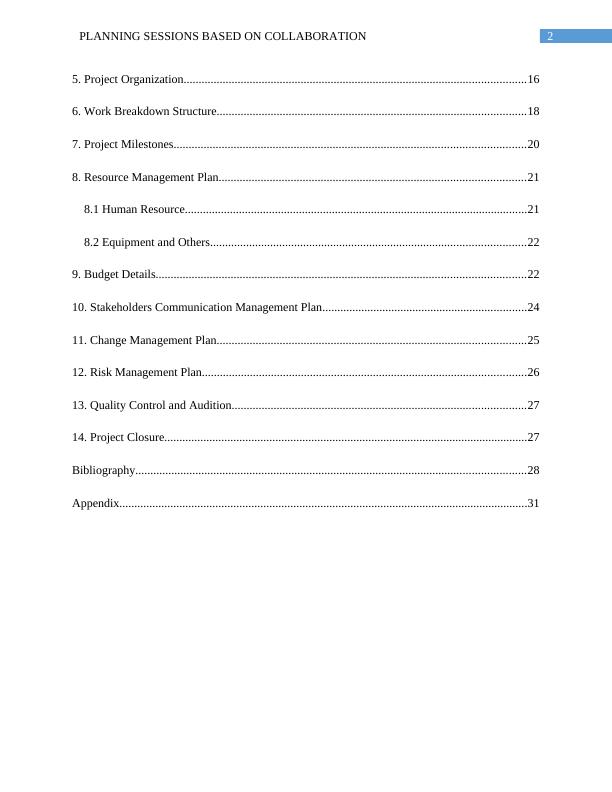
3PLANNING SESSIONS BASED ON COLLABORATION
Executive Summary
Project Name Planning Sessions Based On Collaboration
Project Manager Jack Smith
Project Type Event Management
Project Goals Planning and coordination of activities of conference and
dinner event
Deliverables The deliverables for the project include the entire details of
the project. This include the major deliverables that would be
produced during the design of the 2 day event. The tangible
deliverables include decorative items, project plan
documentation, tables, chairs, furniture, electric appliances,
name tags and water supply. The non-tangible deliverables
include financial plan, a proper list of task activities, and the
accommodation details of guests, caterer list and details of
event planning management team.
Project Management Method Waterfall Model
Project Budget $63,920
Project Schedule Start: 04/04/2019
Closure: 25/05/2019
Duration: 67 days
Milestones 15/04/2019 Completion of Project Plan
19/04/2019 Completion of the Project Phase
19/04/2019 Completion of the procurement of speakers
22/04/2019 Completion of Delegate Management process
19/05/2019 Completion of the finalising of preparation phase
19/04/2019 Completion of the Planning Phase
20/04/2019 Completion of Dinner Event Plan
12/04/2019 Completion of planning of room phase
30/04/2019 Completion of the Guest Planning Phase
06/05/2019 Completion of Staff Requirement Phase
08/05/2019 Completion of Project Closure Phase
Risks Finding of proper event management planning team
Scheduling of activities
Executive Summary
Project Name Planning Sessions Based On Collaboration
Project Manager Jack Smith
Project Type Event Management
Project Goals Planning and coordination of activities of conference and
dinner event
Deliverables The deliverables for the project include the entire details of
the project. This include the major deliverables that would be
produced during the design of the 2 day event. The tangible
deliverables include decorative items, project plan
documentation, tables, chairs, furniture, electric appliances,
name tags and water supply. The non-tangible deliverables
include financial plan, a proper list of task activities, and the
accommodation details of guests, caterer list and details of
event planning management team.
Project Management Method Waterfall Model
Project Budget $63,920
Project Schedule Start: 04/04/2019
Closure: 25/05/2019
Duration: 67 days
Milestones 15/04/2019 Completion of Project Plan
19/04/2019 Completion of the Project Phase
19/04/2019 Completion of the procurement of speakers
22/04/2019 Completion of Delegate Management process
19/05/2019 Completion of the finalising of preparation phase
19/04/2019 Completion of the Planning Phase
20/04/2019 Completion of Dinner Event Plan
12/04/2019 Completion of planning of room phase
30/04/2019 Completion of the Guest Planning Phase
06/05/2019 Completion of Staff Requirement Phase
08/05/2019 Completion of Project Closure Phase
Risks Finding of proper event management planning team
Scheduling of activities
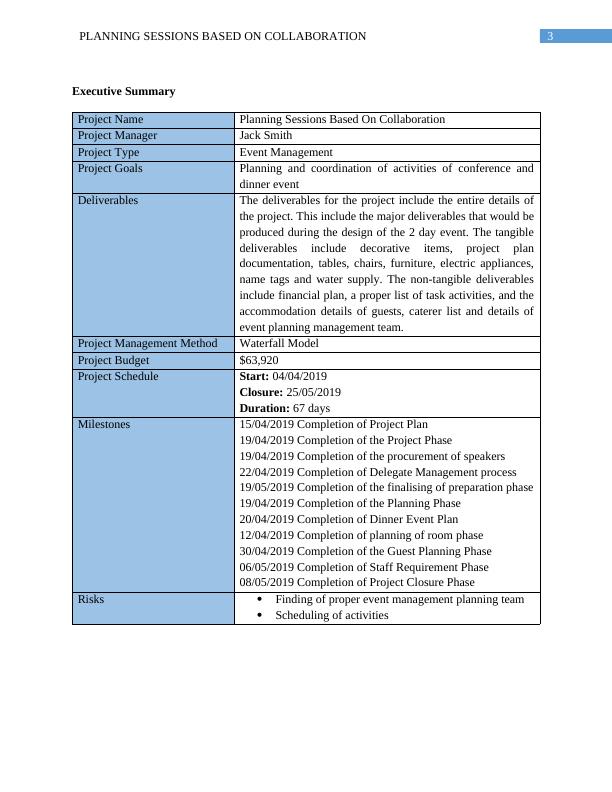
4PLANNING SESSIONS BASED ON COLLABORATION
1. Background and Purpose
The project is based on designing a plan for a 2-day event that would be organized at the
Dunedin site of OPAIC. On several discussions, it has been discussed that collaboration is one of
the most important aspect within the OPAIC philosophy. Hence, each of the academic staffs at
all campuses would collaborate for the 2019 term. The event sessions would help in enabling
schools to develop separate sessions on planning. They would also discuss about best practices to
be incorporated within the Iwi/Maori Corporation.
2. Project Scope
2.1 Objectives
The Otago Polytechnic Auckland International Campus (OPAIC) is primarily located in
downtown of Auckland. The campus is situated in Queen Street and is in the heart of the
business and shopping area (Heagney, 2016). They also provide the best form of facilities, free
Wi-Fi, computer labs and a student lounge. The OPAIC have planned to host the event based on
a 2 day conference for the purpose of discussing about the existing and new educational
programs (Chang, 2016). The event would focus on different planning sessions and including
best practices. They also plan to provide a formal dinner to the delegates at their Dunedin site.
This event would also include speech sessions based on OPAIC leadership.
2.2 Deliverables
The deliverables for the project include the entire details of the project. This include the
major deliverables that would be produced during the design of the 2 day event. The tangible
deliverables include decorative items, project plan documentation, tables, chairs, furniture,
electric appliances, name tags and water supply (Kerzner, 2019). The non-tangible deliverables
1. Background and Purpose
The project is based on designing a plan for a 2-day event that would be organized at the
Dunedin site of OPAIC. On several discussions, it has been discussed that collaboration is one of
the most important aspect within the OPAIC philosophy. Hence, each of the academic staffs at
all campuses would collaborate for the 2019 term. The event sessions would help in enabling
schools to develop separate sessions on planning. They would also discuss about best practices to
be incorporated within the Iwi/Maori Corporation.
2. Project Scope
2.1 Objectives
The Otago Polytechnic Auckland International Campus (OPAIC) is primarily located in
downtown of Auckland. The campus is situated in Queen Street and is in the heart of the
business and shopping area (Heagney, 2016). They also provide the best form of facilities, free
Wi-Fi, computer labs and a student lounge. The OPAIC have planned to host the event based on
a 2 day conference for the purpose of discussing about the existing and new educational
programs (Chang, 2016). The event would focus on different planning sessions and including
best practices. They also plan to provide a formal dinner to the delegates at their Dunedin site.
This event would also include speech sessions based on OPAIC leadership.
2.2 Deliverables
The deliverables for the project include the entire details of the project. This include the
major deliverables that would be produced during the design of the 2 day event. The tangible
deliverables include decorative items, project plan documentation, tables, chairs, furniture,
electric appliances, name tags and water supply (Kerzner, 2019). The non-tangible deliverables
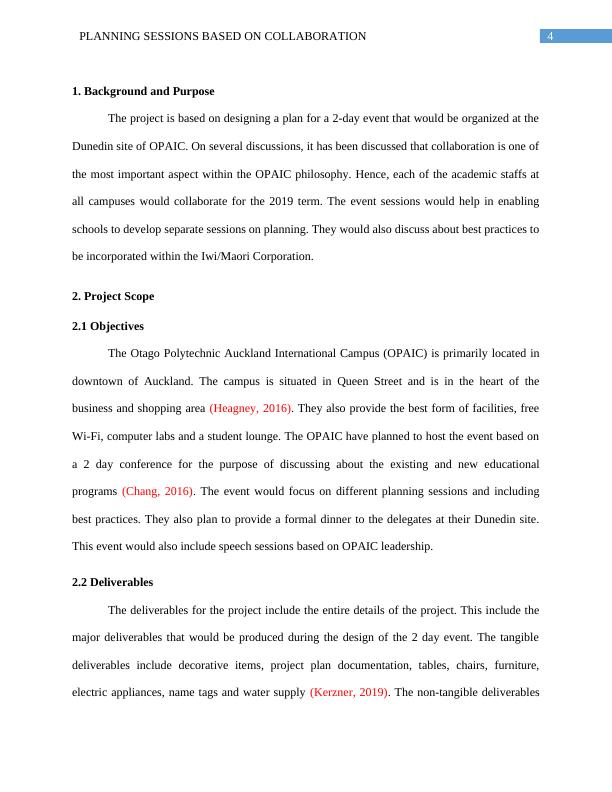
5PLANNING SESSIONS BASED ON COLLABORATION
include financial plan, a proper list of task activities, and the accommodation details of guests,
caterer list and details of event planning management team.
2.3 Limitations
The limitations within the project development include the limited budget and time-frame
for planning and executing the entire project.
2.4 Exclusions
The exclusions within the project are – Discussion about the operations team performing
the project, any kind of additional time frame, and additional costs, source of food or drink
supply and details of decoration.
2.5 Technical Details
During the design of the event management project held for the conference event, some
of the technical standards that could be included within the project design are:
New ISO 20121: Standard for Sustainable Events Management
This standard is mainly used for supporting the event organizers to plan different event
types such as business, cultural, sports or political (Conforto & Amaral, 2016). This is meant for
the integration of sustainability based on the activities.
Health and Safety at Work Act 2015 – This is a legislation based on certain regulations
that are defined under the Act. This regulation is based on concerning of safe work within a
relevant organisational performance.
ISO31000:2009 Risk Management, Principles and Guidelines – This Act helps in
supporting of any public, community or private enterprise, group, association or individual to
include financial plan, a proper list of task activities, and the accommodation details of guests,
caterer list and details of event planning management team.
2.3 Limitations
The limitations within the project development include the limited budget and time-frame
for planning and executing the entire project.
2.4 Exclusions
The exclusions within the project are – Discussion about the operations team performing
the project, any kind of additional time frame, and additional costs, source of food or drink
supply and details of decoration.
2.5 Technical Details
During the design of the event management project held for the conference event, some
of the technical standards that could be included within the project design are:
New ISO 20121: Standard for Sustainable Events Management
This standard is mainly used for supporting the event organizers to plan different event
types such as business, cultural, sports or political (Conforto & Amaral, 2016). This is meant for
the integration of sustainability based on the activities.
Health and Safety at Work Act 2015 – This is a legislation based on certain regulations
that are defined under the Act. This regulation is based on concerning of safe work within a
relevant organisational performance.
ISO31000:2009 Risk Management, Principles and Guidelines – This Act helps in
supporting of any public, community or private enterprise, group, association or individual to
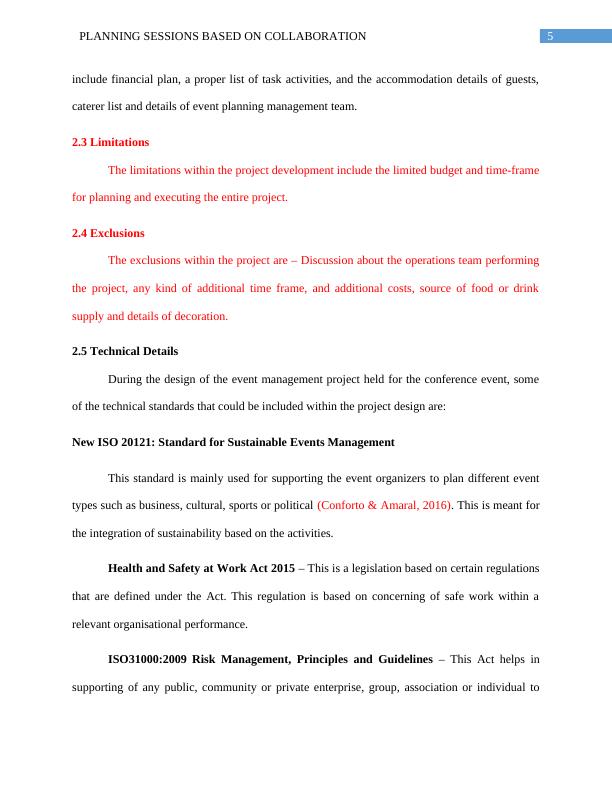
6PLANNING SESSIONS BASED ON COLLABORATION
safely work within the workplace. This principle also helps in guiding against the type of risk,
their nature and whether it would have negative or positive consequences.
BS 7909:2011 Code of practice for temporary electrical systems – This Act helps in
guiding individual and specially electricians to safely deploy electrical appliances and thus
progress with the work. This would ensure the safety of other individuals within the workplace
(Lei et al., 2017). This law also ensures that all electrical installations should be able to comply
with the Act and only highly competent persons would be responsible for carrying out of the
work.
Food Act 2014 – This Act is based within the New Zealand Act of Parliament that was
passed in 2014. This Act is a statutory obligation based on treating of food in a safe manner as it
would be intended for the human consumption within a controlled and managed manner
(Hopkin, 2018). The primary requirements of the Act is based on the fact that the food should
comply with the requirements of food safety. The substance, nature and demanded quality should
be correctly described and labelled.
2.6 Stakeholder Analysis
The stakeholders involved within the project include the academic staff, the speakers who
would deliver lectures during the conference event, the management staff of the OPAIC, the
project designers who would plan the entire event and project sponsors (Forbrig & Herczeg,
2015). These stakeholders would be responsible for maintaining the entire design stage of the
project.
The internal stakeholders would be responsible for the managerial and making decisions
based on planning. On the other hand, the external stakeholders would be mainly be involved
safely work within the workplace. This principle also helps in guiding against the type of risk,
their nature and whether it would have negative or positive consequences.
BS 7909:2011 Code of practice for temporary electrical systems – This Act helps in
guiding individual and specially electricians to safely deploy electrical appliances and thus
progress with the work. This would ensure the safety of other individuals within the workplace
(Lei et al., 2017). This law also ensures that all electrical installations should be able to comply
with the Act and only highly competent persons would be responsible for carrying out of the
work.
Food Act 2014 – This Act is based within the New Zealand Act of Parliament that was
passed in 2014. This Act is a statutory obligation based on treating of food in a safe manner as it
would be intended for the human consumption within a controlled and managed manner
(Hopkin, 2018). The primary requirements of the Act is based on the fact that the food should
comply with the requirements of food safety. The substance, nature and demanded quality should
be correctly described and labelled.
2.6 Stakeholder Analysis
The stakeholders involved within the project include the academic staff, the speakers who
would deliver lectures during the conference event, the management staff of the OPAIC, the
project designers who would plan the entire event and project sponsors (Forbrig & Herczeg,
2015). These stakeholders would be responsible for maintaining the entire design stage of the
project.
The internal stakeholders would be responsible for the managerial and making decisions
based on planning. On the other hand, the external stakeholders would be mainly be involved
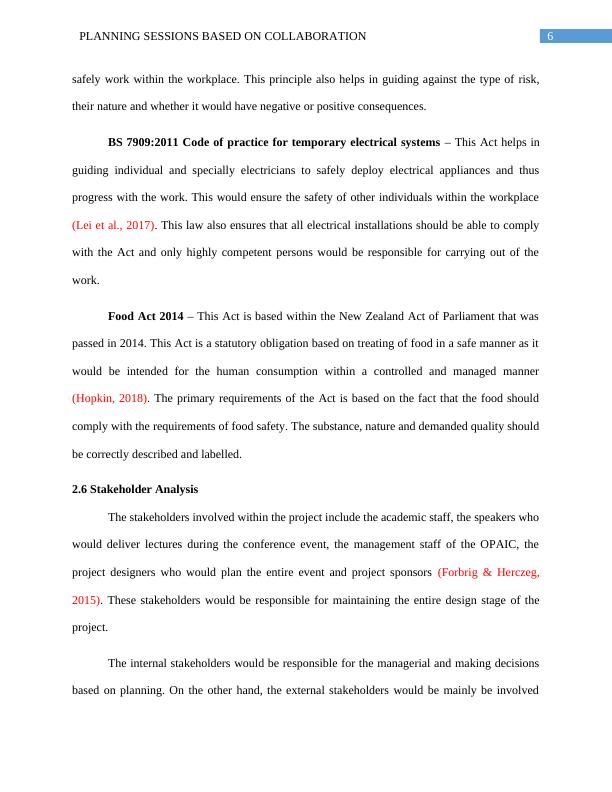
7PLANNING SESSIONS BASED ON COLLABORATION
with producing the entire event (Drury-Grogan, 2014). They would primarily be influenced with
the success of the initiatives of sustainability.
The stakeholders within the project are - John Smith – CEO, Mark Anderson - Project
Manager, Andrew Simons - Project Manager, Robert Wan - Event Manager, Samuel Russel –
Contractor.
2.7 Gantt Chart and Network Diagram of Conference Session
Task Name Duration Resource Names
Hosting of Conference Session Project 52 days
Start of Project 0 days
Initiation and Project Planning 12 days
Preparing of project plan 1 day Project Manager
Identification of proper speakers 1 day Project Manager
Checking the details of event dates 1 day
Planning for choosing the event planners 2 days Project Manager,
Project Sponsor
Sending of conference details to marketing and finance team 2 days
Planning of budget by finance team 2 days Finance team
Sanctioning of the estimated budget 1 day Project Sponsor
Booking of the event planning team and finalsing payment 1 day Project Sponsor
Setting up of conference email details 1 day Project Manager
Creation of registration form for interested candidates 1 day Project Manager
Completion of project plan 0 days
Procurement of Venue 4 days
Selection of Venue 2 days Project Manager
Updating details to the event manager 1 day Project Manager
Confirming of the venue and initiation of design of the work 1 day Project Manager
with producing the entire event (Drury-Grogan, 2014). They would primarily be influenced with
the success of the initiatives of sustainability.
The stakeholders within the project are - John Smith – CEO, Mark Anderson - Project
Manager, Andrew Simons - Project Manager, Robert Wan - Event Manager, Samuel Russel –
Contractor.
2.7 Gantt Chart and Network Diagram of Conference Session
Task Name Duration Resource Names
Hosting of Conference Session Project 52 days
Start of Project 0 days
Initiation and Project Planning 12 days
Preparing of project plan 1 day Project Manager
Identification of proper speakers 1 day Project Manager
Checking the details of event dates 1 day
Planning for choosing the event planners 2 days Project Manager,
Project Sponsor
Sending of conference details to marketing and finance team 2 days
Planning of budget by finance team 2 days Finance team
Sanctioning of the estimated budget 1 day Project Sponsor
Booking of the event planning team and finalsing payment 1 day Project Sponsor
Setting up of conference email details 1 day Project Manager
Creation of registration form for interested candidates 1 day Project Manager
Completion of project plan 0 days
Procurement of Venue 4 days
Selection of Venue 2 days Project Manager
Updating details to the event manager 1 day Project Manager
Confirming of the venue and initiation of design of the work 1 day Project Manager
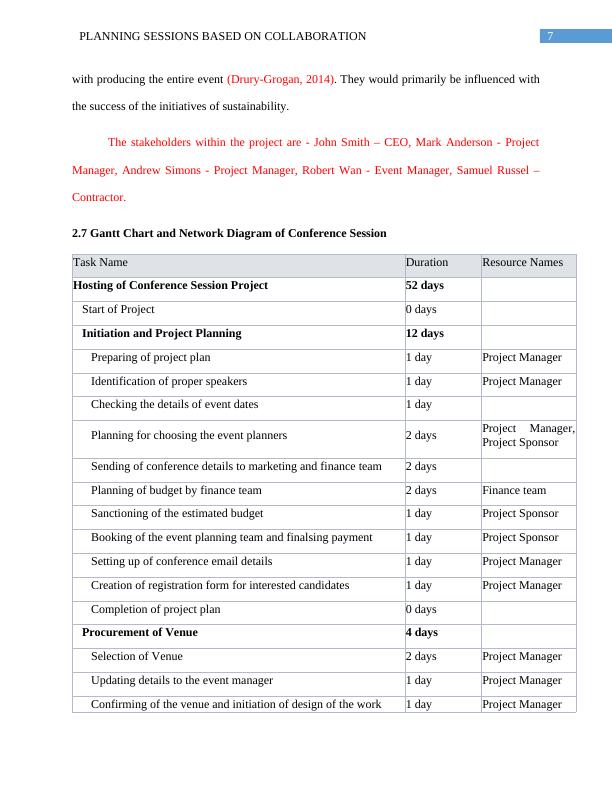
End of preview
Want to access all the pages? Upload your documents or become a member.
Related Documents
Project Closure Reportlg...
|10
|1735
|109
Project Closure and Documentation for First National Banklg...
|10
|1984
|69
Project Management Progress Reportlg...
|11
|1794
|282
Project Management: Online Simulation Gamelg...
|32
|4685
|297
VoIP/G-suite Projectlg...
|11
|1440
|128
Max Lionel reality case studylg...
|10
|1399
|34
